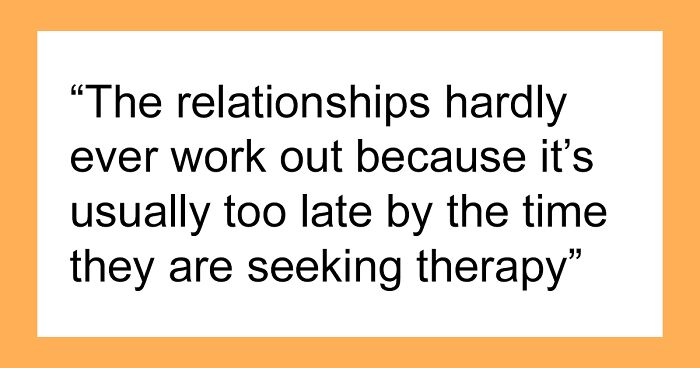
30 Therapists Share Moments They Realized Relationships Were Not Going To Work And What They Did
Relationships are a lot of hard work! You need proper communication, lots of patience, and tons of respect for one another if you plan on making things work in the long term. However, there are times when folks can’t seem to work out their differences and argue constantly. That’s when some of them might reach out to couples therapists or marriage counselors for help.
Though these professionals help many of their clients, some of them seem nearly beyond their aid. Bored Panda has collected some of the most open and honest therapists’ posts on Reddit about how they handle cases when couples have deeply troubled relationships that they might feel won’t last. Scroll down for their stories.
This post may include affiliate links.
 I would note that in my training we are taught that it is unethical to continue couple's therapy with a relationship where one partner is abusing the other. My SIL and her former husband were in this situation (he was/is abusive) - their therapist basically told her that he couldn't continue working with them because her husband was abusive and she should leave him. I give a lot of props to that therapist since this was in a highly conservative/religious area where divorce is really frowned upon, and this was a specifically religious therapist.
I would note that in my training we are taught that it is unethical to continue couple's therapy with a relationship where one partner is abusing the other. My SIL and her former husband were in this situation (he was/is abusive) - their therapist basically told her that he couldn't continue working with them because her husband was abusive and she should leave him. I give a lot of props to that therapist since this was in a highly conservative/religious area where divorce is really frowned upon, and this was a specifically religious therapist.
My therapist (not a couple’s therapist) was working with a woman whose husband was abusive. She got to the point where she finally left him and the pos guy came to my therapist’s office and threatened him. So now my therapist keeps a gun in his desk.
 Not a therapist here, but training to be one.
My professor was a couples therapist for 25 years. She said on the first session she would take each person in her office separately and ask them "on a scale of 1 to 10, how much do you want to work on this relationship and stay together?"
She said that she could construct a treatment plan based on where the numbers were relative to each other. So her plan would look different if a couple answered like 8&9 than if they looked like 1&2. She said the saddest were when it was like 1&10 because then it was more about helping that person who was a 10 slowly accept that things weren't going to work out.
Not a therapist here, but training to be one.
My professor was a couples therapist for 25 years. She said on the first session she would take each person in her office separately and ask them "on a scale of 1 to 10, how much do you want to work on this relationship and stay together?"
She said that she could construct a treatment plan based on where the numbers were relative to each other. So her plan would look different if a couple answered like 8&9 than if they looked like 1&2. She said the saddest were when it was like 1&10 because then it was more about helping that person who was a 10 slowly accept that things weren't going to work out.
Good idea... seeing the partners separately and guaging the situation.
 In all my years of marriage counseling, I’ve realized the one sign that a couple won’t make it. They show contempt for each other. Not even hatred or anger, just disdain. Eg eye-rolling, diminishing one another’s points etc.
In all my years of marriage counseling, I’ve realized the one sign that a couple won’t make it. They show contempt for each other. Not even hatred or anger, just disdain. Eg eye-rolling, diminishing one another’s points etc.
Divorce and annulment rates have actually decreased over the past couple of decades in the United States. There were 689,308 divorces in 2021, compared to 944,000 in 2000, according to Forbes. That means that the divorce rate dropped from 4 per 1,000 to ‘just’ 2.5 per 1,000 people.
However, marriage rates have declined as well. They’ve dropped from 8.2 per 1,000 people in 2000 to merely 6 per 1,000 by 2021. This may in part explain why there are fewer dissolved unions in recent years: if fewer people get married, fewer of them get divorced as a result.
 Therapist here... In my experience strong healthy relationships are built on two very important qualities: trust and respect. Love is not included in these qualities because love is not a determiner of a strong/healthy relationship.
Dysfunctional relationships are still possible among people who love each other. And loving someone isn't the only reason to stay with a person. Many of the clients that I've worked with in the past who are in very dysfunctional relationships have actually stayed solely because of love, but continue to struggle in those relationships because they lack trust and respect.
Without respect and trust most relationships are doomed to struggle or fail. For the couples that I've worked with I always assess for whether or not trust and respect is present. And then build treatment goals around seeing if it possible to develope those qualities. If they are not willing or able, then in most cases those relationships are likely to end.
Therapist here... In my experience strong healthy relationships are built on two very important qualities: trust and respect. Love is not included in these qualities because love is not a determiner of a strong/healthy relationship.
Dysfunctional relationships are still possible among people who love each other. And loving someone isn't the only reason to stay with a person. Many of the clients that I've worked with in the past who are in very dysfunctional relationships have actually stayed solely because of love, but continue to struggle in those relationships because they lack trust and respect.
Without respect and trust most relationships are doomed to struggle or fail. For the couples that I've worked with I always assess for whether or not trust and respect is present. And then build treatment goals around seeing if it possible to develope those qualities. If they are not willing or able, then in most cases those relationships are likely to end.
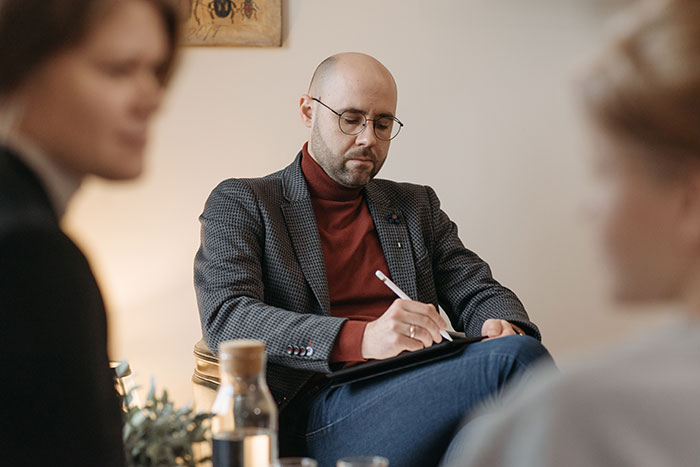 Not personally, but I did have a professor tell a story of doing this in a single session.
Basically when he was working as a couples therapist he had one couple who came in for their very first session and the wife immediately starts going off on him. She tells the therapist that the relationship is never going to work, she wants to break up, and the only reason she was there was because her husband insisted. The husband, meanwhile, sits there quietly for thirty minutes while the wife explains all the reasons she can't stand him anymore.
Eventually the therapist leans back and says something to the effect of: "You're right. If you don't want to be in the relationship there's nothing I can do, nor do I think I should try to talk you out of it. If you don't want therapy, maybe you would be better off apart."
Apparently she looked incredulous and they got up and left. The ridiculous part is that she apparently called the therapist about a half hour after that screaming, saying what a bad therapist he was and how they were going to prove him wrong and make things work. Apparently all she needed to want to make an effort was to be told she couldn't do it. People are funny sometimes.
Not personally, but I did have a professor tell a story of doing this in a single session.
Basically when he was working as a couples therapist he had one couple who came in for their very first session and the wife immediately starts going off on him. She tells the therapist that the relationship is never going to work, she wants to break up, and the only reason she was there was because her husband insisted. The husband, meanwhile, sits there quietly for thirty minutes while the wife explains all the reasons she can't stand him anymore.
Eventually the therapist leans back and says something to the effect of: "You're right. If you don't want to be in the relationship there's nothing I can do, nor do I think I should try to talk you out of it. If you don't want therapy, maybe you would be better off apart."
Apparently she looked incredulous and they got up and left. The ridiculous part is that she apparently called the therapist about a half hour after that screaming, saying what a bad therapist he was and how they were going to prove him wrong and make things work. Apparently all she needed to want to make an effort was to be told she couldn't do it. People are funny sometimes.
 My cousin is a marriage counselor, and she said that most couples visiting her have one person who is trying to rebuild the relationship, and the other one has already mentally packed up and left. The sessions usually turn into grief counseling for the one who hasn't figured out it's over already.
My cousin is a marriage counselor, and she said that most couples visiting her have one person who is trying to rebuild the relationship, and the other one has already mentally packed up and left. The sessions usually turn into grief counseling for the one who hasn't figured out it's over already.
How about if one has mentally packed and gone, and the other, annoyingly doesn't see what the problem is?
The average marriage lasts around 8 years in the US while the average contested divorce takes a year to finalize. Simple divorces, on the other hand, can be finalized in barely 3 months. Dissolving unions is no easy feat financially, however: the entire process costs $7,000, on average.
Forbes notes that around half of all first marriages end up being dissolved. However, second and third marriages fail at a far higher rate. A whopping 67% of second marriages end in divorce. Meanwhile, 73% of third marriages end up being dissolved.
 In my experience, a woman desperately wanted to remain with her husband. Their marriage had gone south and she set up weeks of sessions. She refused to leave him, and told me she would always be a patient and forgiving wife. Her husband was disrespectful to her in therapy, trying to convince me she was a terrible and inadequate wife. Cursing, spitting, the whole lot. There was no excuse or reason to justify to the things he would say about her. Meanwhile, she’d be in session nearly doubled over in tears. Her husband later was speculated a narcissist, but refused any psychological assessments. She put up with years of abuse, and even got stood up expecting her husband to show up to sessions on multiple occasions. I couldn’t work with him. It was clear he had no desire to change. This makes therapy extremely difficult. I told them I could not see them as a couple any longer. I advised the wife to divorce, as I was aware of the abuse, and suggested to them the relationship was toxic. I knew I was biased towards his wife, and had developed negative feelings toward him; therefore, unethical therapy. The guy was an a**hole. I couldn’t even bring myself to pretend to be neutral in any fashion and cut him off as soon as possible. I continued seeing her individually for a while but she relocated. Hope she’s doing great!
In my experience, a woman desperately wanted to remain with her husband. Their marriage had gone south and she set up weeks of sessions. She refused to leave him, and told me she would always be a patient and forgiving wife. Her husband was disrespectful to her in therapy, trying to convince me she was a terrible and inadequate wife. Cursing, spitting, the whole lot. There was no excuse or reason to justify to the things he would say about her. Meanwhile, she’d be in session nearly doubled over in tears. Her husband later was speculated a narcissist, but refused any psychological assessments. She put up with years of abuse, and even got stood up expecting her husband to show up to sessions on multiple occasions. I couldn’t work with him. It was clear he had no desire to change. This makes therapy extremely difficult. I told them I could not see them as a couple any longer. I advised the wife to divorce, as I was aware of the abuse, and suggested to them the relationship was toxic. I knew I was biased towards his wife, and had developed negative feelings toward him; therefore, unethical therapy. The guy was an a**hole. I couldn’t even bring myself to pretend to be neutral in any fashion and cut him off as soon as possible. I continued seeing her individually for a while but she relocated. Hope she’s doing great!
 I have seen couples in therapy for many, many years. I learned early on that the problem is usually an interaction effect. As I tell people, it's like bleach and ammonia - two excellent things that simply become toxic when mixed together.
Years ago in addiction treatment - we had the coke addict husband and the wife who really didn't want him to recover because the coke meant 10K income per month (early 1980's). Who's the problem?
We have the cheater and the spouse who hasn't wanted to have sex in the marriage for 10 years. Who's the problem? Who created that distance, who perpetuated it? What happened to create this schism?
We have the one-income household and the spouse who had no idea this called for a 1950s lifestyle where the stay-at-home took care of the household responsibilities like kids, cooking, and cleaning. They never negotiated what their one-income household would look like. Who's the problem?
To answer your question, I would say I can pick out the "problem" person perhaps 20% of the time. Usually it is truly an interaction effect, two people who simply do horribly as a couple. Sometimes I can see very clearly that one person is Over It. Nothing anyone can do to save this relationship.
Most of the time I can see what broke in the couple. I would say it rarely one person's fault. I definitely tell the truth to the couple as to what I am seeing, fully aware that I am a new visitor to their life, fully aware that I could be totally wrong.
Usually what I have in my office is two people wanting to be heard.
I have seen couples in therapy for many, many years. I learned early on that the problem is usually an interaction effect. As I tell people, it's like bleach and ammonia - two excellent things that simply become toxic when mixed together.
Years ago in addiction treatment - we had the coke addict husband and the wife who really didn't want him to recover because the coke meant 10K income per month (early 1980's). Who's the problem?
We have the cheater and the spouse who hasn't wanted to have sex in the marriage for 10 years. Who's the problem? Who created that distance, who perpetuated it? What happened to create this schism?
We have the one-income household and the spouse who had no idea this called for a 1950s lifestyle where the stay-at-home took care of the household responsibilities like kids, cooking, and cleaning. They never negotiated what their one-income household would look like. Who's the problem?
To answer your question, I would say I can pick out the "problem" person perhaps 20% of the time. Usually it is truly an interaction effect, two people who simply do horribly as a couple. Sometimes I can see very clearly that one person is Over It. Nothing anyone can do to save this relationship.
Most of the time I can see what broke in the couple. I would say it rarely one person's fault. I definitely tell the truth to the couple as to what I am seeing, fully aware that I am a new visitor to their life, fully aware that I could be totally wrong.
Usually what I have in my office is two people wanting to be heard.
 Met a couple where the husband constantly disparaged his wife. It was just pure toxic. I had to tell them to consider alternative options.
Met a couple where the husband constantly disparaged his wife. It was just pure toxic. I had to tell them to consider alternative options.
Hara Estroff Marano writes on Psychology Today that couples therapy explores the root causes of relationship problems. The main goal is to resolve these dysfunctional patterns of interaction, including undoing the emotional damage that both partners have inflicted on one another.
Ideally, both people walk away from these therapy sessions after becoming more in tune with their needs and learning how to communicate them to their partner in a healthy, clear, and timely manner. What’s also necessary is for the couple to understand the need to support their partner, instead of constantly fighting with them over every tiny little issue.
 Therapist here. I have a lot more experience with family therapy as opposed to just strictly seeing couples.
Generally it wouldn’t be appropriate to tell a client what to do, especially with an enormous life decision like divorce. I did see a couple where I thought it was very unlikely that they’d be able to reconcile because they would not put aside their need to hurt each other emotionally in order to do the necessary work to repair their marriage. Plus the wife had disclosed to me that she only was staying in the marriage out of guilt and was miserable.
I might ask questions like, “do you feel like living this way is sustainable?” etc, to get the gears turning. Generally I help people feel more confident about how they’re already feeling/what they already want to do.
Therapist here. I have a lot more experience with family therapy as opposed to just strictly seeing couples.
Generally it wouldn’t be appropriate to tell a client what to do, especially with an enormous life decision like divorce. I did see a couple where I thought it was very unlikely that they’d be able to reconcile because they would not put aside their need to hurt each other emotionally in order to do the necessary work to repair their marriage. Plus the wife had disclosed to me that she only was staying in the marriage out of guilt and was miserable.
I might ask questions like, “do you feel like living this way is sustainable?” etc, to get the gears turning. Generally I help people feel more confident about how they’re already feeling/what they already want to do.
 Most depressing thing I ever heard from my friend who is a couples therapist is that the relationships hardly ever work out because it's usually too late by the time they are seeking therapy.
Most depressing thing I ever heard from my friend who is a couples therapist is that the relationships hardly ever work out because it's usually too late by the time they are seeking therapy.
Nah . . . I believe the latest stats I read suggest that about 65% of couples in therapy improve. However, because therapy is still seen as a sign of weakness (especially by men), by the time people make it to therapy it can be rough. That's why the 65% figure is so encouraging. [Retired clinical psychologist here.]
 It's very easy to work out when one person knowingly prioritises their own wants and needs over their partners. Relationships like this are often doomed because the person simply doesn't care enough to make any meaningful change.
It's very easy to work out when one person knowingly prioritises their own wants and needs over their partners. Relationships like this are often doomed because the person simply doesn't care enough to make any meaningful change.
It seems to me that a lot of relationships are like this. People ask, "What can you do for me?" rather than "What can I do for you?". Relationships should be about your significant other, not you. You seek to help them and they seek to help you. My favorite saying is "the rising tide raises all ships". It's just *so* true.
 More often than you'd think, people come into marriage counseling after they've already decided their marriage is over. Often, people feel pressured to "try to fix it" by doing professional couples work, when in reality they're just doing it so they can look back after the divorce and be able to say they've done everything they could. If I get that sense, I often ask them if I'm there to help them repair their marriage, or if my job will be to facilitate a healthy divorce process or co-parenting plan. Many couples seem relieved when this comes up, as pretending to do the work of couples therapy is, in that case, just delaying the inevitable.
Edit- also, it's extremely unethical to continue to provide services that will not be of a benefit to them. So, the thought process OP describes would be a terrible example of a therapist. Referring cases to someone else or simply saying, "I can't help and here's why.." is more than okay.
More often than you'd think, people come into marriage counseling after they've already decided their marriage is over. Often, people feel pressured to "try to fix it" by doing professional couples work, when in reality they're just doing it so they can look back after the divorce and be able to say they've done everything they could. If I get that sense, I often ask them if I'm there to help them repair their marriage, or if my job will be to facilitate a healthy divorce process or co-parenting plan. Many couples seem relieved when this comes up, as pretending to do the work of couples therapy is, in that case, just delaying the inevitable.
Edit- also, it's extremely unethical to continue to provide services that will not be of a benefit to them. So, the thought process OP describes would be a terrible example of a therapist. Referring cases to someone else or simply saying, "I can't help and here's why.." is more than okay.
 I saw a couple that was doing "retaliatory" cheating (and telling each other about it). When they got through their anger, they decided to call a truce and made peace. With their level of emotional maturity, I doubt it lasted. I don't know if I helped them or prolonged their suffering. It was their decision to come to counseling, so I think it was the help they wanted.
Other clients realize what they really want is "divorce counselling". What's the best way to behave civilly and minimize damage to the kids while we go our separate ways?
I saw a couple that was doing "retaliatory" cheating (and telling each other about it). When they got through their anger, they decided to call a truce and made peace. With their level of emotional maturity, I doubt it lasted. I don't know if I helped them or prolonged their suffering. It was their decision to come to counseling, so I think it was the help they wanted.
Other clients realize what they really want is "divorce counselling". What's the best way to behave civilly and minimize damage to the kids while we go our separate ways?
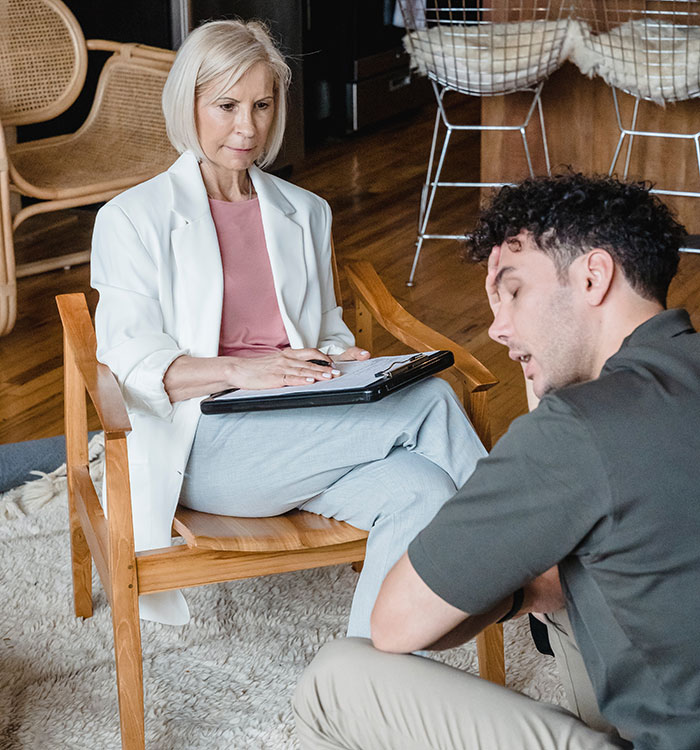 Active independence from each other is my #1 sign of “this marriage is about to spiral downward”. As soon as I realize a couple is doing things separately, like applying for car loath without the others knowledge, or planning personal trips without consulting the other, I know that the couple is soon doomed.
Active independence from each other is my #1 sign of “this marriage is about to spiral downward”. As soon as I realize a couple is doing things separately, like applying for car loath without the others knowledge, or planning personal trips without consulting the other, I know that the couple is soon doomed.
Ah, yes it's the car loath that will get you every time.
 At the first session, I explain to both partners the goal of therapy is not to keep them together. The goal is to help them improve how they communicate with each other to resolve conflict and/or differences. No guarantee of the outcome. If they decide to end the relationship, at least they can be civil about it and communicate respectfully, honestly, and in ways they feel good about themselves. When I have been directly asked my opinion about a couple staying together, I usually ask if the one person can (1) imagine their future without the other and (2) look past and/or accept the [fill in the blank] because the relationship is worth it or the person has more positive qualities. I have talked to individual clients about why they should end their relationship, especially if it is abusive or toxic, but usually I try to help the individual look at pros/cons of staying and identify consequences for choices.
At the first session, I explain to both partners the goal of therapy is not to keep them together. The goal is to help them improve how they communicate with each other to resolve conflict and/or differences. No guarantee of the outcome. If they decide to end the relationship, at least they can be civil about it and communicate respectfully, honestly, and in ways they feel good about themselves. When I have been directly asked my opinion about a couple staying together, I usually ask if the one person can (1) imagine their future without the other and (2) look past and/or accept the [fill in the blank] because the relationship is worth it or the person has more positive qualities. I have talked to individual clients about why they should end their relationship, especially if it is abusive or toxic, but usually I try to help the individual look at pros/cons of staying and identify consequences for choices.
 It depends on the situation, but I generally do not tell people to split. I explore the relationship and see if this is the kind of relationship the client likes or wants. We'll then compare and contrast the two relationship types and explore how to either 1) make the relationship fit or 2) change relationships.
The reason it depends? Abusive relationships. They tend to require a different approach. You can't sit and watch your client being beaten while you process through positive and negative relationships. You have to be a little more proactive when safety is involved.
For me, generally "This is a bad relationship you don't need" comes after the client identifies the relationship isn't one they need. It's used as a confirmation instead of a demand.
It depends on the situation, but I generally do not tell people to split. I explore the relationship and see if this is the kind of relationship the client likes or wants. We'll then compare and contrast the two relationship types and explore how to either 1) make the relationship fit or 2) change relationships.
The reason it depends? Abusive relationships. They tend to require a different approach. You can't sit and watch your client being beaten while you process through positive and negative relationships. You have to be a little more proactive when safety is involved.
For me, generally "This is a bad relationship you don't need" comes after the client identifies the relationship isn't one they need. It's used as a confirmation instead of a demand.
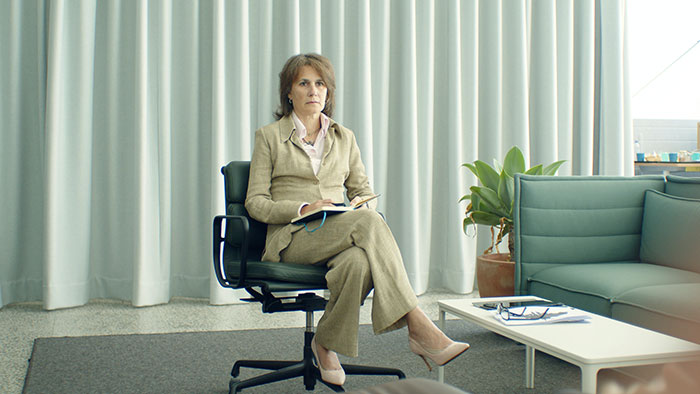 As a therapist it’s not my place to try to get them to reunify...that takes their power and gives it to me instead of me teaching them skills to make their own informed decision. That being said, whenever one half of the couple comes in and says they’re there because their spouse made them come, it’s pretty rare that they decide to stay together.
As a therapist it’s not my place to try to get them to reunify...that takes their power and gives it to me instead of me teaching them skills to make their own informed decision. That being said, whenever one half of the couple comes in and says they’re there because their spouse made them come, it’s pretty rare that they decide to stay together.
 Current marriage and couples therapy graduate intern. We aren’t supposed to explicitly tell clients they shouldn’t be together, the most we can do is tell them that unless they’re committed to each other we cannot continue therapy.
The closest I came was a couple in which there was mutual domestic abuse and the male partner used the female partners past sexual abuse to shame her into sex, as best as I could I would reflect back his words to her until she recognized how terrible things were and she could no longer commit to him or the relationship. We discontinued couples counseling when they broke up in session and I still see just here as an individual client.
Current marriage and couples therapy graduate intern. We aren’t supposed to explicitly tell clients they shouldn’t be together, the most we can do is tell them that unless they’re committed to each other we cannot continue therapy.
The closest I came was a couple in which there was mutual domestic abuse and the male partner used the female partners past sexual abuse to shame her into sex, as best as I could I would reflect back his words to her until she recognized how terrible things were and she could no longer commit to him or the relationship. We discontinued couples counseling when they broke up in session and I still see just here as an individual client.
 All relationships are "resolvable" until one party decides they won’t put in the effort. These people are fairly easy to spot, even at the beginning. Still, humans have a great capacity for change and surprises do occur.
All relationships are "resolvable" until one party decides they won’t put in the effort. These people are fairly easy to spot, even at the beginning. Still, humans have a great capacity for change and surprises do occur.
 I try not to think of this issue in terms of "can I help them" as much as "will they do what is necessary to repair this relationship." It is often immediately clear that discrepancies exist in motivation, and this usually holds true upon further assessment. Here are the couples I see that I'm less optimistic about:
Couples who refuse to participate in counseling. I give all kinds of homework, usually related to enhancing communication and building connection. Couples who come back after the first few sessions and report zero effort to do any homework (and not just my homework, but things that would serve the same purpose) are usually couples who have checked out.
Heterosexual couples where men refuse to accept that their female partners have anything valuable to say.
Couples who want me to be a referee.
Couples where one partner "just knows that so-and-so is cheating and why wont they just admit it already."
Fighting I can handle. Intimacy issues I can handle. But folks that want me to wave a magic wand and fix their marriage, folks who are trapped in an ideological box that tells them they don't need to do any work, are usually not ready for help.
I try not to think of this issue in terms of "can I help them" as much as "will they do what is necessary to repair this relationship." It is often immediately clear that discrepancies exist in motivation, and this usually holds true upon further assessment. Here are the couples I see that I'm less optimistic about:
Couples who refuse to participate in counseling. I give all kinds of homework, usually related to enhancing communication and building connection. Couples who come back after the first few sessions and report zero effort to do any homework (and not just my homework, but things that would serve the same purpose) are usually couples who have checked out.
Heterosexual couples where men refuse to accept that their female partners have anything valuable to say.
Couples who want me to be a referee.
Couples where one partner "just knows that so-and-so is cheating and why wont they just admit it already."
Fighting I can handle. Intimacy issues I can handle. But folks that want me to wave a magic wand and fix their marriage, folks who are trapped in an ideological box that tells them they don't need to do any work, are usually not ready for help.
 I'm not technically licensed yet, but I'm practicing as a couples therapist. My own personal belief is that I don't know if a couple can make it or not. There are tons of different kinds of marriages, and people get really creative at making it work.
I've only been at it a year, but I've seen some pretty amazing things, including couples on the brink of divorce getting back to where they used to be, and some pretty sexist husbands start to realize that maybe women are worth respecting. Its taught me to not give up hope.
That said, I won't help couples who are actively violent- especially if there's power involved (ie, only one of the partners is violent towards the other, rather than both get physical with each other). For that, I suggest they separate until the violent one can get some coping skills and be safe.
I'm not technically licensed yet, but I'm practicing as a couples therapist. My own personal belief is that I don't know if a couple can make it or not. There are tons of different kinds of marriages, and people get really creative at making it work.
I've only been at it a year, but I've seen some pretty amazing things, including couples on the brink of divorce getting back to where they used to be, and some pretty sexist husbands start to realize that maybe women are worth respecting. Its taught me to not give up hope.
That said, I won't help couples who are actively violent- especially if there's power involved (ie, only one of the partners is violent towards the other, rather than both get physical with each other). For that, I suggest they separate until the violent one can get some coping skills and be safe.
I don't understand how you're practicing without a license, but I do like what you said. It seems to me that many therapists make up there minds early on about how things will go. The danger with that is it becomes a self-fullfilling prophecy because the therapists likely act in ways that leads to the outcome they expect. And that's not good for the clients.
Look up narcissist/Covert narcissist. Everyone is the problem except them. They terrorize the family and create so much drama it's insane!
Both my parents were narcissists, my father covert. He'd go to church every week twice on Sundays, Bible groups you name it and everyone outside the family thought he was lovely. Behind closed doors he abused us kids (never my mother) then laughed about it. His Christianity was just an act, a way for him to get narcissistic supply. My mother was more than happy to remain 'oblivious' to the abuse. She even said we deserved it. Hate them both.
 Former therapist. There is no such thing as being right for each other.
Any two people can make a positive life together if they so choose. However, communication, understanding, and acceptance play huge roles in that.
At times, it becomes pretty clear either one or both partners aren’t willing to compromise or come together on certain issues.
But to answer your question. I’ve never gone out and said it because a good therapist shouldn’t. But i have said that things needs to be addressed and both need to take a more active role in their marriage/relationship otherwise it is bound to fail.
Former therapist. There is no such thing as being right for each other.
Any two people can make a positive life together if they so choose. However, communication, understanding, and acceptance play huge roles in that.
At times, it becomes pretty clear either one or both partners aren’t willing to compromise or come together on certain issues.
But to answer your question. I’ve never gone out and said it because a good therapist shouldn’t. But i have said that things needs to be addressed and both need to take a more active role in their marriage/relationship otherwise it is bound to fail.
There absolutely is a such thing as two people being right for each other. My husband and I are. It's not 100% rosy all the time, but we have the trust and respect thing down. Lord knows no one else could understand and tolerate me.
Couples therapist. Can't tell them they shouldn't be together, but I have had couples yell at each other in session non stop a couple of times, cutting me off when I tried to talk and tried to interrupt their yelling. After about five minutes of just sitting there listening to them calling each other names and cursing and accusing, I stood up while they were yelling at each other and said, "Hey! Can't do this in here. You can do that at home but you can't yell like that in my office. Are you willing to stop yelling and have a real conversation now?" The answer was "Yes" and they sat down, but immediately started blaming the other person and yelling at each other again. I stood up, opened the door and said, "You have to leave. This isn't counseling, this isn't helping and you have to leave now." They did. On their way out I told them to call me if they wanted to try again. They didn't. I don't know if they stayed together or not in both cases.
 Nearly graduated couples therapist here— generally there aren’t many issues that can come up that are completely unresolvable but there are some. Generally though it just comes down to compromising and if you can actually slow down and “hear” your partner properly. Sadly many couples come to therapy too late for this and simply can’t muster up the motivation to complete homework assignments or really take what us therapists say to heart. It’s kinda sad, but the couples who I’ve seen be the most successful in therapy are the ones who come in early on when they recognize a problem, are fully committed to one another, and really put effort into things. Only 40% of work done in therapy is really up to the therapist. The rest is up to the clients, therapists can only do so much.
Nearly graduated couples therapist here— generally there aren’t many issues that can come up that are completely unresolvable but there are some. Generally though it just comes down to compromising and if you can actually slow down and “hear” your partner properly. Sadly many couples come to therapy too late for this and simply can’t muster up the motivation to complete homework assignments or really take what us therapists say to heart. It’s kinda sad, but the couples who I’ve seen be the most successful in therapy are the ones who come in early on when they recognize a problem, are fully committed to one another, and really put effort into things. Only 40% of work done in therapy is really up to the therapist. The rest is up to the clients, therapists can only do so much.
 What I try to do with my clients is step out of the mindset that they are "right" or "wrong" for each other, and instead help them to both try and validate who the other person just "is" while asserting their own identity, needs, feelings, desires for themselves. If a couple is able to do this, in my mind, then they are able to at least continue as a couple for some more time to come. If they are not, they hopefully come to this understanding on their own - and I try to be up front about my beliefs with them at the start. Sadly, usually if they're not succeeding in reconciliation they leave therapy and may blame the therapist for being unhelpful, more than their relationship being irreparable. And that could be true!
What I try to do with my clients is step out of the mindset that they are "right" or "wrong" for each other, and instead help them to both try and validate who the other person just "is" while asserting their own identity, needs, feelings, desires for themselves. If a couple is able to do this, in my mind, then they are able to at least continue as a couple for some more time to come. If they are not, they hopefully come to this understanding on their own - and I try to be up front about my beliefs with them at the start. Sadly, usually if they're not succeeding in reconciliation they leave therapy and may blame the therapist for being unhelpful, more than their relationship being irreparable. And that could be true!
 As a therapist, I know it's common for one or both people to go to therapy to check a box. You know the "I did everything I could" box. If that is the did attitude that you have your chances for success are slimmer, though not impossible. I don't tell anyone they shouldn't be together. I do point out that there actions or attitudes might not demonstrate that the relationship is very important to them. The *only* time I recommend seriously that people not be together is in the case of abuse. The first priority them is to protect the victim(s).
As a therapist, I know it's common for one or both people to go to therapy to check a box. You know the "I did everything I could" box. If that is the did attitude that you have your chances for success are slimmer, though not impossible. I don't tell anyone they shouldn't be together. I do point out that there actions or attitudes might not demonstrate that the relationship is very important to them. The *only* time I recommend seriously that people not be together is in the case of abuse. The first priority them is to protect the victim(s).
 Pretty often one person is the problem - but the other person is the issue. The issue is communicating, acceptance, or indecision.
Ie. One spouse is lazy and a lout and the other person has had to deal with it and grown resentful. A lazy lout after 15 years will never be significantly different to you or erase the frustration you have. You being angry about that wont stop them from being what they are
Pretty often one person is the problem - but the other person is the issue. The issue is communicating, acceptance, or indecision.
Ie. One spouse is lazy and a lout and the other person has had to deal with it and grown resentful. A lazy lout after 15 years will never be significantly different to you or erase the frustration you have. You being angry about that wont stop them from being what they are
 Not a therapist but my aunt is. She tells me alot about since im very interested in her field of work.
She never reached to that point yet with any clients of her. However, theres one couple that gave her the hardest time with. Basically their relationship involved s**t ton of physical fighting. Im not talking about physical or verbal abuse. Fighting, like UFC type of fighting. Their house were full of broken furnitures because of their fights. They even almost ready to fight each other during the session despite my aunt sitting there yelling therapist expert languages.
Have no idea how she eventually bring that couple "normal" again. Maybe advised them to switch to WWE?
Not a therapist but my aunt is. She tells me alot about since im very interested in her field of work.
She never reached to that point yet with any clients of her. However, theres one couple that gave her the hardest time with. Basically their relationship involved s**t ton of physical fighting. Im not talking about physical or verbal abuse. Fighting, like UFC type of fighting. Their house were full of broken furnitures because of their fights. They even almost ready to fight each other during the session despite my aunt sitting there yelling therapist expert languages.
Have no idea how she eventually bring that couple "normal" again. Maybe advised them to switch to WWE?
I haven't advocated a separation yet, but when I begin to see the writing on the wall I begin to discuss options of what separation might look like. I'm a guide to goals, meaning I try not to tell people if they want to married or not. I take their desires, regardless, and guide to constructive solutions.
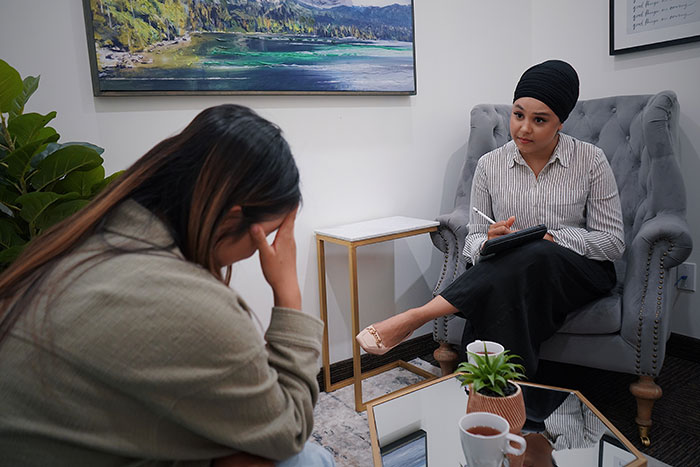 Own and operate a private practice, been almost 10 years now. It is almost always skewed one way, and often extremely so.
My first big career obstacle was overcoming my own desire for acceptance from others. It prevented me from calling out unacceptable behavior, due to worry of accusations of bias, negative reviews, etc. I definitely "levelled up" when I gained enough experience to feel confident in call outs. It is extremely rare though and the mark of a clumsy therapist. Imagine trying to take apart a computer, but a part is stuck so you whack it with a hammer.
The art of therapy and how you know someone is very good is it'll feel like a regular conversation. You'll have excellent flow, some personal stories and laughs. Skills, tips, insight, etc are integrated smoothly into conversation.
Last week had a client messaging escorts while the client is on business trips. Giving escorts the address and room number. Claims they didn't meet and it's the partners fault for snooping through their phone. Adamant they have done nothing wrong, messaging isn't cheating. Sometimes it is extremely one sided.
Common is the stronger (relationship skills wise) partner pushing for therapy and weaker partner pulled along.
Common split is 60/40 or so. Most common issues: attachment style conflicts, anxiety, communication, lacking personal skills, toxic models, addiction, weak resolution/recovery, unrealistic expectations about partner/life in general
Own and operate a private practice, been almost 10 years now. It is almost always skewed one way, and often extremely so.
My first big career obstacle was overcoming my own desire for acceptance from others. It prevented me from calling out unacceptable behavior, due to worry of accusations of bias, negative reviews, etc. I definitely "levelled up" when I gained enough experience to feel confident in call outs. It is extremely rare though and the mark of a clumsy therapist. Imagine trying to take apart a computer, but a part is stuck so you whack it with a hammer.
The art of therapy and how you know someone is very good is it'll feel like a regular conversation. You'll have excellent flow, some personal stories and laughs. Skills, tips, insight, etc are integrated smoothly into conversation.
Last week had a client messaging escorts while the client is on business trips. Giving escorts the address and room number. Claims they didn't meet and it's the partners fault for snooping through their phone. Adamant they have done nothing wrong, messaging isn't cheating. Sometimes it is extremely one sided.
Common is the stronger (relationship skills wise) partner pushing for therapy and weaker partner pulled along.
Common split is 60/40 or so. Most common issues: attachment style conflicts, anxiety, communication, lacking personal skills, toxic models, addiction, weak resolution/recovery, unrealistic expectations about partner/life in general
I'm studying to be a Marriage and Family Therapist. From the couples I've dealt with, in order for the therapy to be anything productive, both people in the relationship have to have wanted to go to therapy to work on their relationship. Sadly, a lot of wait too long to ask for help and when they do actually seek it out, it's only because they both know it's over and it's a last ditch effort to keep the relationship going for as long as possible.
I've been a licensed marriage and family therapist for fifteen years. I've worked with couples who have improved their relationships and others who have divorced. I would never come out and say I don't think they're going to make it, but work with them to realize their own needs and wants. Generally though, my intuition is pretty good on how a relationship will turn out. There isn't a formula or certain set of circumstances that lead to a certain outcome. Generally issues arise as we move the different life phases.
Marriage therapist here, I specialize in affairs. Never. Relationship therapy is about clarity and about pushing aside defense mechanisms in order to access authentic, vulnerable, real selves and learning how to love and be loved. Any therapist who says problems are unresolvable is a therapist who is focusing in on the wrong goal. I have, however, looked at a couple and said "perhaps I'm not the best therapist for you, as what I have to offer doesn't seem to be getting us anywhere. " This, when we all feel stuck. Usually that is because someone is not being honest.
This is what I've learned: You cannot have higher expectations for someone than what they have for themselves. And vice-versa. I've had clients that frustrated the heck out of me because I set the bar too high, so I thought we weren't getting anywhere. Conversely, I remember one couple I saw where I thought that there was no hope, but somehow they made it work. The bottom line is that going in with pre-conceived notions is rarely helpful-- people are always surprising.
 This woman and her husband were dropped of by her father. He had heard of the quality of our work and figured they could use some help. Most co-dependend people I've ever seen, never thought they would stick it through. But last I heard Beth and Jerry are still together. Wich is good because on Nuptia 4 we pride ourselves on our work.
This woman and her husband were dropped of by her father. He had heard of the quality of our work and figured they could use some help. Most co-dependend people I've ever seen, never thought they would stick it through. But last I heard Beth and Jerry are still together. Wich is good because on Nuptia 4 we pride ourselves on our work.
I have never told a couple that they were not right for each other. I am very resistant to the idea that I can ever be so certain a relationship won't work that I could say that. I have refused to take on a couple as a client because there was abuse going on. I recommended that the abusive individual get Individual therapy because of the risk concerns to the abused person. I work very collaboratively with my clients. If I am ever feeling stuck in the room and I feel like I am seeing an issue that isn't getting better, Ill bring it up, express my concerns that this issue isnt resolving, and start a discussion about their ideas and the risk of that issue leading to the relationship not working. I try to be open, honest, and respect the autonomy of my clients to figure out what they want out of the relationship including ending it.
Actual marriage counselor here, in my experience the reason that most couples come in is because one spouse wants to salvage the relationship more than the other spouse. So, generally I will work with the couple to try and rebuild the connection usually by improving communication skills. That being said if I notice that a spouse is pulling away and marriage counseling will not work, I will meet with the spouse that is clinging to the marriage and tell them to prepare themselves for a divorce or separation. I usually have that spouse work on making themself happy and building a life where their happiness is not dependent on someone else. After all is said and done I refer my clients ,as needed, to individual counseling.
My brother is a therapist who does a lot of marriage counseling. He likes working with couples who already have a good relationship but just want to work on some specific issues. He told me, if he could just say what he actually thought most couples should do, he would tell most of his married couples with major problems that they should get a divorce, try to remember the good times in their relationship with sincere good feelings, and move on. There's really no fixing a relationship that's gone sour and that's ok. Divorce shouldn't be taboo and just because a relationship ends doesn't have to mean the whole thing was a waste. I don't think I've ever met anybody who is divorced and is upset that they got divorced. Generally the feelings of regret are that they didn't do it earlier.
My wife and I sent my middle stepchild to a therapist because he had behavioral issues and we wanted to try to get him help. I felt like nothing was getting addressed and all he was doing was taking him to arcades and to play. He did that here. He had friends, games, money to buy things... I told my wife it felt like we were wasting money and getting no insight or useful advice. When we had a rough patch, we agreed to go see him for marriage counseling. On the first appointment, within 20 minutes, he said we should get a divorce. I got up, grabbed my coat, and told him "I knew it! You are a fraud. I am not listen to this quack steal our time and money anymore. You're a quack." Not all therapists are good at their job.
My wife and I sent my middle stepchild to a therapist because he had behavioral issues and we wanted to try to get him help. I felt like nothing was getting addressed and all he was doing was taking him to arcades and to play. He did that here. He had friends, games, money to buy things... I told my wife it felt like we were wasting money and getting no insight or useful advice. When we had a rough patch, we agreed to go see him for marriage counseling. On the first appointment, within 20 minutes, he said we should get a divorce. I got up, grabbed my coat, and told him "I knew it! You are a fraud. I am not listen to this quack steal our time and money anymore. You're a quack." Not all therapists are good at their job.

 Dark Mode
Dark Mode 

 No fees, cancel anytime
No fees, cancel anytime 














































































